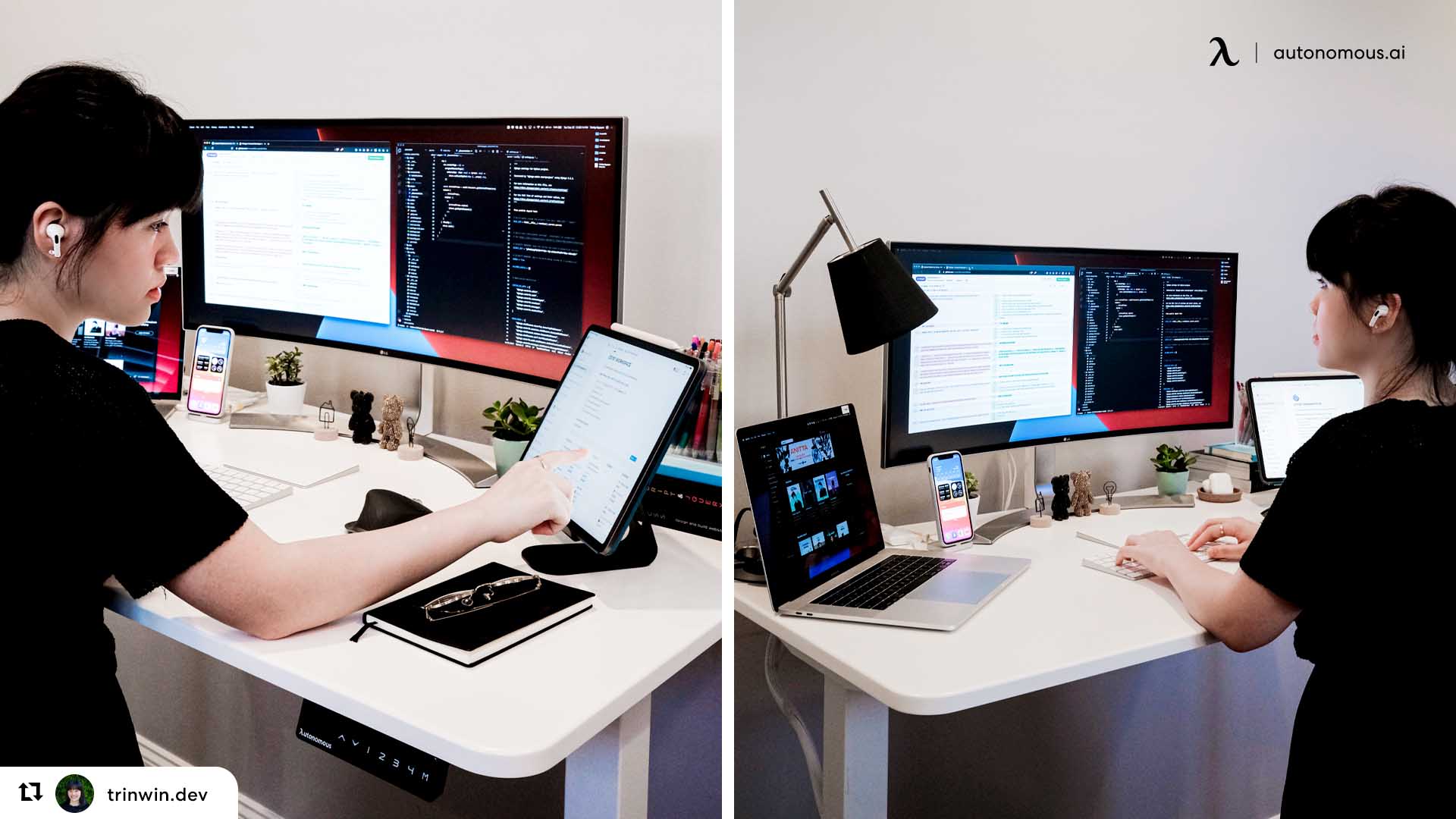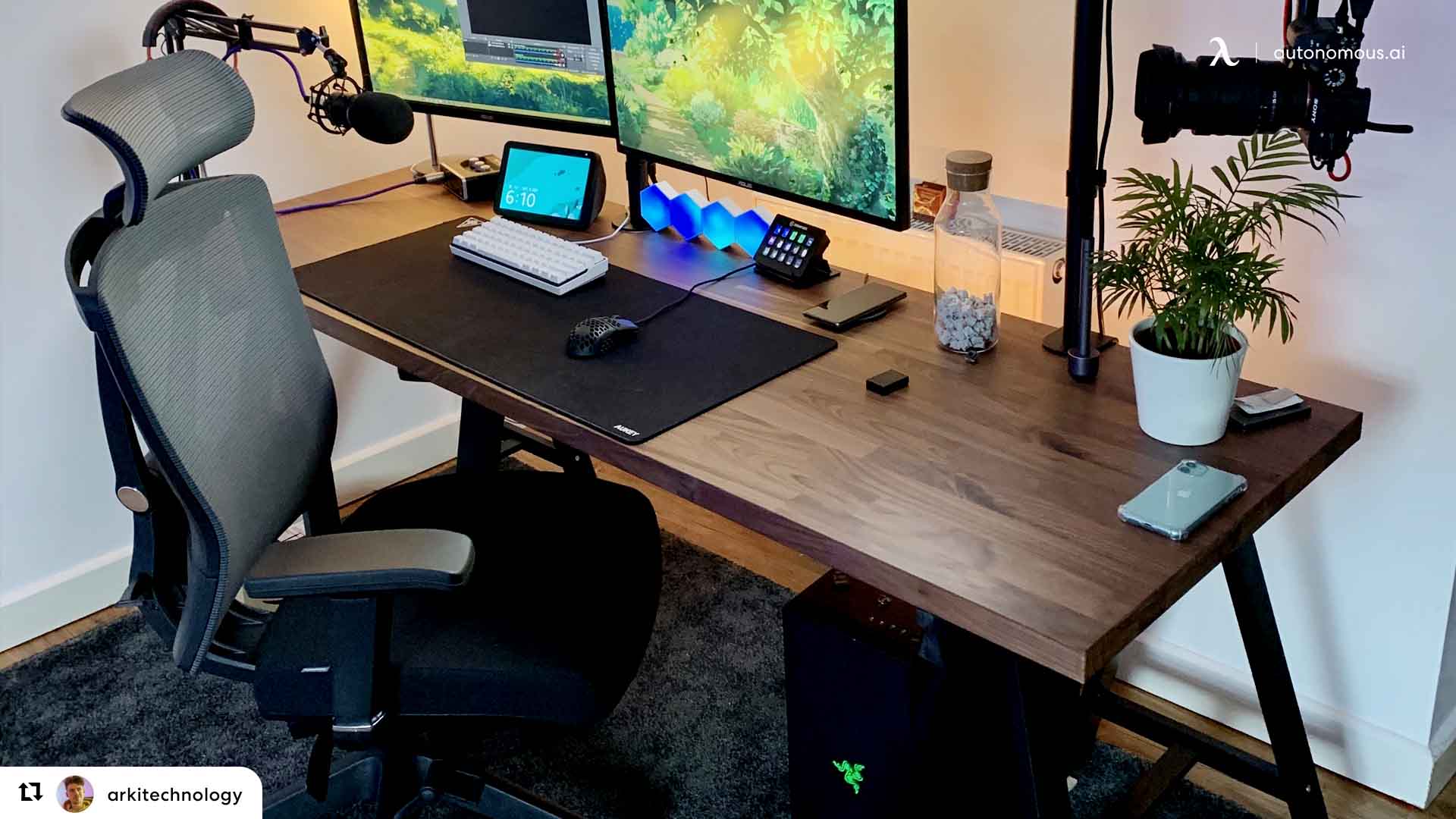10 Tips to Have Productive Day At Work When Working From Home
If you've ever decided to work at home, you probably know that one of the biggest challenges is maintaining a daily productive day at work. It's hard to stay productive at home when no one is looking to make sure you're working, especially when there are so many more exciting things to do in your place! Thus, if you can't have a productive day at home, you may end up back in the office in no time.
Working at home offers many advantages, including ultimate comfort and a workspace free of interruptions from colleagues. However, there are also several challenges. Maximizing productivity in your home-based workplace requires an absolute separation between your professional and personal life. You must pay careful attention to your work responsibilities.
According to the book "Happiness at Work," we spend 90,000 working hours in our lives. So we need to make them as productive and enjoyable as possible. The good news is that you don't have to review your entire program. Incorporating a handful of effortless work habits can help you be more productive at home and feel more engaged in your work. In this article, we discuss some engaging ways to have a productive day.
1. The Trend of Shifting from Office Working to Home Working
Teleworking is growing slowly but steadily. It represents crucial social, political, and economic issues. The expected reduction in daily travel is part of the fight against pollution and the search for energy savings. From the employee's point of view, this same limitation of travel is presented as a source of financial savings, time savings, and stress relief.
Working from home would make it possible to move to a "healthier" living environment, away from city centers and large conurbations. It would make it easier to reconcile family and professional life and manage domestic and work activities more effectively.
According to a study published by the consulting firm Greenworking, teleworking could be suitable for a better productive day at work and employees' motivation. In the same vein, employees are more relaxed and gain, on average, 22% in productivity if they work at home at least eight hours a week. More calm, more concentration, less transportation, and less stress, working from home also improves quality of life. On average, a teleworker gains 37 minutes a day for family life. The only problem is that teleworking blends work and private life.
2. 10 Ways to Make Working from Home More Productive and Get Productive Day at Work
A company's productivity is very much connected to a personal productive day at work. In a broader context, the worker's actions or decisions mainly affect the productivity of the company.
Emails, phone calls, online meetings; the day goes by at a hectic pace, and you feel like you don't have enough time to do everything! Maybe it's time to learn how to be more productive at home.
In this regard, we've listed 10 efficient tips for working from home to have a productive day, no matter what your occupation.
2.1. Prioritize Work Over Sleep
This doesn't mean you should cut back on your sleep. As Arianna Huffington explains in her sleep novel, "The Sleep Revolution," a good night's sleep can improve efficiency and productivity, increase your decision-making skills, and generate more excellent ideas.
2.2. Maintain a Work Routine
Working from home is moderately flexible. You are responsible for your working hours, and there is no one around to remind you of when you are supposed to work.
It is essential to maintain and implement a work routine to help you avoid being distracted. It also allows you to finish your work on time.
Also, for a productive day, remember to stay focused on your work. Create a boundary between leisure and work. Distractions are limitless when you're at home, so it's important to learn how to prevent them.
2.3. Create a Unique Workspace for More Daily Productive Day at Work
There is a wide range of spaces at home where you can work conveniently. Designating your workspace for only work provides you with that office feeling and enhances your motivation to work even harder.
Having your workspace dedicated to business, only, also gives you the privacy and peace you need when working. Therefore, maintaining a peaceful environment and surroundings can help you stay mentally focused.
2.4. Learn How to Rest
Since you work in your home's comfort, it's easier to get overwhelmed by your workload. Too much work can sometimes be a little frustrating and tiring.
Remember to allow yourself to rest, get some fresh air, and regain your energy. Know when to stop and when to resume work. This can help you think much more clearly and reduce stress.
2.5. Create a to-do List
Sometimes having too much work can make you forget some of the things you plan to do in a day. Distractions are endless when you're at home, so creating a task list in advance can help you remember your priorities.
Also, try to keep your workspace clean so that it doesn't distract you from work and plan to do household chores before or after work.
2.6. Avoid Multitasking Mode
Today, performing several tasks simultaneously with a high level of concentration is a myth. Moreover, once you are distracted, it can take an average of 15 minutes to get back on track. If you think you can be a more productive day at work with multitasking, stop now!
2.7. Develop Your Curiosity
Curiosity helps you understand how things work, not just accept them as they are. By understanding how these processes work, you can optimize them and make them more efficient and productive.
A curious and proactive worker sees problems from different angles and tries to find alternative solutions to accomplish his missions more efficiently to increase his productive day at work.
2.8. Communication Is the Key!
When you are at a distance from your colleagues and managers, it is essential to communicate well. Share your schedule with your team and colleagues and tell them how you are progressing or completing your tasks to make sure you are all on the same wavelength.
It's not a matter of telling your manager about every move you make. Instead, it's about giving the important things, even if you do it more than once, to ensure that all the information is shared.
2.9. Set Work Schedules
Being at home all the time tends to blur the boundaries between working time and downtime. However, it is just as important to separate work time from leisure time to separate your workspace from your leisure space.
Some remote workers tend to start the workday late and work for short periods interrupted by household chores, conversations with family members, or other distractions. They end up having to work late into the evening to complete the workload. In this way, they never reach the level of concentration needed for more complex tasks and are also at risk of exhaustion.
You need to set your own work from home schedule: work as much as possible during office hours and ensure that you have long periods of uninterrupted work and have time to relax at the end of the workday.
2.10. Get Some Exercise
On average, every American sits for about seven hours every day. The consequences for health are far from negligible: cardiovascular disease, type 2 diabetes, or back problems. The human being is not made to remain in a sitting position for several hours at a time—the WHO recommends a minimum of 30 minutes of exercise per day.
You can divide this 30 minutes into three 10 minute sessions of activity during your working day. You can also do some exercises at your own standing desk if you don’t have much break time.
3. Tips to Put on Your Checklist for a Productive Day
We are always looking for approaches to working smarter from home, from optimizing our inboxes to streamlining meetings. But being productive isn't just about tackling every task on your to-do list or having more downtime (although those things are fabulous!). Nevertheless, freeing up time and mental energy also allows you to invest more time on larger projects that develop your skills, add value to your business, and give you a greater sense of fulfillment.
Every job is different. However, staying a productive day at work every day has common traits in most occupations.
3.1. Start the Day With Something You Love
Your morning can set the tone for your day. Spend at least five minutes each morning on something you enjoy, such as meditation, reading, or sipping a cup of coffee.
3.2. Reduce Quick Responses
In our ultra-connected world, it's easy to feel like you need to respond immediately to every email, text, or meeting invitation. However, it's healthier to take the time to respond in most situations. It also causes other people not to expect an immediate response from you.
3.3. Greet Your Colleagues
A Workplace Trends study revealed that 60% of the study respondents would stay longer in a company if they had more friends there.
Socializing at work makes you feel more engaged in your profession.
3.4. Don't Assume Anything
It is easy to misinterpret the tone in an e-mail or misunderstand a casual comment as a personal attack.
Don't be afraid to ask questions rather than assume or take things personally. Emotional intelligence can make your job much happier.
3.5. Learn to Move More
Taking plenty of mini-breaks is key to staying productive, focused, energetic, and engaged when working from home. Find simple ways to get away from work and get your body moving throughout the day.
3.6. Reduce Time Spent on Social Media
We have all done it. We jump on Facebook or Twitter to emerge 30 minutes later and wonder where the time has passed.
To avoid digital distractions, schedule specific times - ideally, at the end of the day or during your lunch break to check your social media accounts.
4. How Can an Ergonomic Home Office Maintain Your Daily Productive Day at Work?
Teleworking has become a requirement in many countries. Are you teleworking and need a pleasant and practical space where you can arrange and store your files?
Here are a few helpful ideas to boost your productivity for a comfortable and ergonomic office space.
4.1. Choose a Space that Meets Your Needs
Set up your home office in a quiet place, away from the noise, the kitchen, and the living room. As much as possible, devote this space only to professional tasks and not to household chores.
4.2. An Ergonomic Standing Desk or Work Table
To be truly productive when working from home, you must have an ergonomic and comfortable standing desk. Desks are available in all sizes, colors, materials, and prices.
You're sure to find exactly what you need to furnish your teleworking space.
4.3. Keep a Good Work Habit
It is necessary to think about work habits to arrange your teleworking corner properly. For example, if you make many phone calls during the day, you should have to choose a well-insulated place from outside noise or install noise barriers.
4.4. An Ergonomic Chair
Even if your home office is not used daily, the purchase of an ergonomic chair should be at the top of your priority list.
4.5. Efficient Storage
Don't forget that important files must be easily accessible. A tidy workspace is essential for a productive day.
Find effective ways to sneak more storage into your workspace.
Working at Home: What Are the Pros and Cons?
You can't get up so early to go to work, you can't stand the time lost in transportation to the office, and you don't want to see your boss's face every morning. Lost in your gloomy thoughts, you have just made a decision: no more company life, from now on, you only work from home.

You don't waste time on transportation.
You have more flexibility in terms of your schedule, and you do as you please.
You increase your daily productivity at home.

Loss of efficiency: When you work at home, it can be challenging to stay focused on your tasks. Distractions are everywhere. There's always something to keep you busy. If you lack self-discipline, it's complicated to accomplish anything.
Overwork: Working at home can also be synonymous with overwork. If you don't know how to set limits, you can find yourself overworked.
Loss of social connection: A workplace is also a place where you can talk and interact with other people. When you work at home, you lose this aspect, and you can feel isolated.
Final Thought
Working from home can keep a company operational during a natural disaster, weather disturbance, or some other circumstance that closes its headquarters. It may also allow workers to take on additional tasks and can be a much more productive day at work.
One way employers can set up their workers to excel in working from home is through home-based work policy implementation. This gives workers standards and allows them to set their working hours, create a viable home workspace, and connect and collaborate with their colleagues.
Subscribe for a 10% discount on your first order.
Sign up for our weekly update and be the first to know about our specials & promotions.
Spread the word














.jpg)


